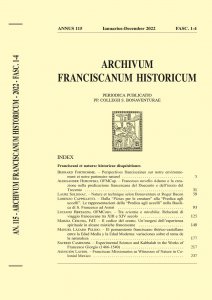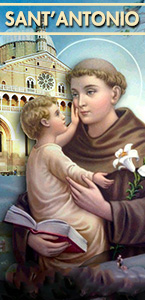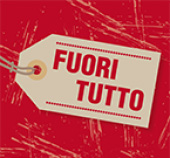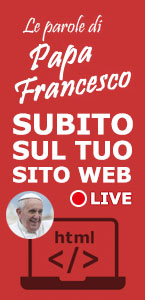INDEX
Franciscani et natura: historicae disquisitiones
Bernard Forthomme. – Perspectives franciscaines sur notre environnement
et notre partenaire naturel
aleksander horowski, oFmCap. – Francesco novello adamo e la creazione
nella predicazione francescana del duecento e dell’inizio del
trecento
laure solignaC. – nature et technique selon Bonaventure et roger Bacon
lorenzo CaPPelletti. – dalla “Pietas per le creature” alla “Predica agli
uccelli”. le rappresentazioni della “Predica agli uccelli” nella Basilica
di s. Francesco ad assisi
luCiano Bertazzo, oFmConv. – tra scientia e mirabilia. relazioni di
viaggio francescane tra Xiii e XiV secolo
marzia CesChia, Fdt. – il codice del creato. un’esegesi dell’esperienza
spirituale in alcune mistiche francescane
manuel lázaro Pulido. – el pensamiento franciscano ibérico-castellano
entre la edad media y la edad moderna: variaciones sobre el tema de
la naturaleza .
saVerio CamPanini. – experimental science and kabbalah in the works of
Francesco giorgio (1466-1540)
asunCión laVrin. – Franciscan missionaries as witnesses of nature in Colonial
mexico
Benedikt mertens, oFm - mauro PaPalini. – la spezieria francescana.
notizie storiche (sec. XVi-XViii) .
Pierre moraCChini. – « Ces horreurs changées en délices ». le sainteynard
vu par le récollet archange de Clairmont
antonio CiCeri. – agostino mandirola e il Manuale di (de’) Giardinieri o
Giardino de’ fiori
Benedikt mertens, oFm. – lerchen am Barockhimmel. Fortunat huebers
Ornithologia moralis (1678)
martin elBel. – the great Comet of 1680. amandus hermann between
theory and experience
Jordan kellman. – a recollect among the dakota sioux: louis hennepin
and the Plains Bison
FaBienne henryot. – Pierre Étienne et le Bonheur rural (1788) : la nature
au coeur de la sécularisation de l’Écriture chez les frères mineurs français
au XViiie siècle
simone BorChi. – i Francescani a la Verna ospiti e affittuari del bosco
(1810-1814 e 1866-1934): dalla prassi alla regolamentazione
Miscellanea
alessandra Bartolomei romagnoli. – il libro di agnese Blannbekin.
mistica e profezia nella Vienna di fine duecento . . . . . . . . . . . . . . . .
Summaria
Recensiones
messa, Pietro [oFm]. – Breviarium Sancti Francisci. un manoscritto tra
liturgia e santità. – (william J. short)
Pirone, Bartolomeo. – al-malik al-kmil e i cristiani d’egitto. – (Jason
welle)
riCCi, adelaide – Apparuit effigies. dentro il racconto delle stigmate. –
(solanus Benfatti)
dalarun, JaCques. – Corpus franciscanum. François d’assise, corps et
textes. – (Bernardo molina)
sChumaCher, lydia - ByChkoV, oleg (eds. and transl.). – a reader in early
Franciscan theology. the Summa Halensis. – (riccardo saccenti)
iohannis de ruPella [omin.] quaestiones disputatae de legibus. – (Claus
a. andersen)
BoBillier, stèVe - thornton, ryan [oFm] (eds.). – Peter of John olivi:
Construction of the human Person. anthropology, ethics, and society.
– (Peter nickl)
Piron, sylVain. – Pietro di giovanni olivi e i francescani spirituali. –
(Paolo Vian)
raimundi lulli opera latina 64, ars ad faciendum et solvendum quaestiones.
– (rafael ramis Barceló)
Pellegrini, letizia. – Bernardo aquilano e la sua Cronaca dell’Osservanza
con nuova edizione e traduzione a fronte. – (antal molnár)
augustin Von alVeldt, oFm. – erklärung und Verteidigung der klarissen-
regel Papst urbans iV. – (alexander sembdner)
Cohen, thomas m. - harrison, Jay t. - reX galindo, daVid (eds.). – the
Franciscans in Colonial mexico. – (Éric roulet)
griPPaudo, ilaria. – musica e devozione nella «Città felicissima». ordini
religiosi e pratiche sonore a Palermo tra Cinque e seicento. – (maria
Paola Borsetta)
moCCiaro, Pietro. – Francesco d’assisi nel settecento riformatore. l’indagine
storico-critica dei gesuiti Bollandisti negli Acta Sanctorum
(1768). – (mícheál mac Craith)
Notae bibliographicae
libri ad nos missi ..
index alphabeticus
tabula materiarum.
index auctorum anni 2022
EDITORIAL NOTE
Earlier this year, we lost Fr. Carlo Paolazzi,
oFM (1938-2022), to Sister Death. He was a
member of the Frati Editori di Quaracchi from 1999
to 2008 and an eminent scholar of Dante alighieri
and of the writings of Francis of assisi. To his
memory, we dedicate this themed aFH volume on
“Franciscans and Nature – Historical investiga -
tions”. in a 2019 lectio magistralis at the Pontifical
University antonianum on Francis’s Canticle of
Brother Sun, the late Fr. Carlo wrote:
Uno dei tratti piu caratteristici della spiritualita evangelica di Francesco
consiste nella rinuncia radicale al possesso delle cose materiali, ma questo
non gli ha impedito di contemplare con occhio stupito tutte le creature,
riscoperte e amate all’interno del disegno provvidente del santissimo
Padre nostro […]. infatti non c’e dubbio che le espressioni frate Sole,
sora luna e frate Vento possono nascere solo da un sentimento
vivissimo della paternita divina, che in forme diverse ha fatto buone, simili
a se e sorelle tra loro tutte le cose.1
This theological intuition of a fraternal interconnectedness of all
creatures and its practical consequences for a respectful human
cohabitation with whatever sora nostra matre Terra (Canticle 20)
produces and hosts did not really develop into an identity marker of
Franciscan thought and Franciscan communities throughout later
centuries. However, to lament this fact would mean to anachronistically
apply current ecological concerns to past times very different from ours.
The theological and intellectual climate at large has not always been
receptive to an engaging view on nature. For example, Friar Candide
Chalippe, in his 1728 Life of St Francis, deplores that heretics and critics
of his time ridiculed the vision of the fraternisation of all creatures and
of a tender-hearted approach to animals, as it springs from Francis’s
biography and Bonaventure’s theological interpretation. For his part, he
apologetically claims that Francis’s stance and the resulting teachings for
his followers were not merely sentimental but in line with what can be
read in Scripture and in the lives of the saints.2
The topic of Francis’s close relationship with the natural
environment will resurface strongly only in the Romantic literature of
the 19th century and is echoed today in his being saintly patron of
ecologists (1979) and a driving force behind Pope Francis’s encyclic
Laudato sì (2015).3 The current volume of aFH humbly attempts to help
fill the gap between Francis and today’s theological and pastoralpractical
contribution to a widening ecological awareness. indeed, we
would like to address many questions to the brothers and sisters of the
Franciscan family between the 13th and 19th centuries: How did they
perceive and interpret nature, and how did they actively shape it? Did
they show concern for natural resources? How did they relate to animals?
Did Francis’s ‘passion for Creation’ also shape the image that later
centuries had of him? The seventeen studies in this volume do not
precisely answer these questions, and, as i said, it would be anachronistic
to expect such answers. Nevertheless, the case studies reveal a wide
variety of historical approaches to nature to be found among Franciscans,
brothers and sisters: philosophical, theological, scientific, experiential,
homiletic, mystical, symbolic, aesthetic, utilitarian, and protective.
it is our wish that these essays may trigger more studies on the
historical (Franciscan) echoes of our current understanding of nature and
our ecological concern.
FR. BENEDikT MERTENS, oFM
General Editor AFH































